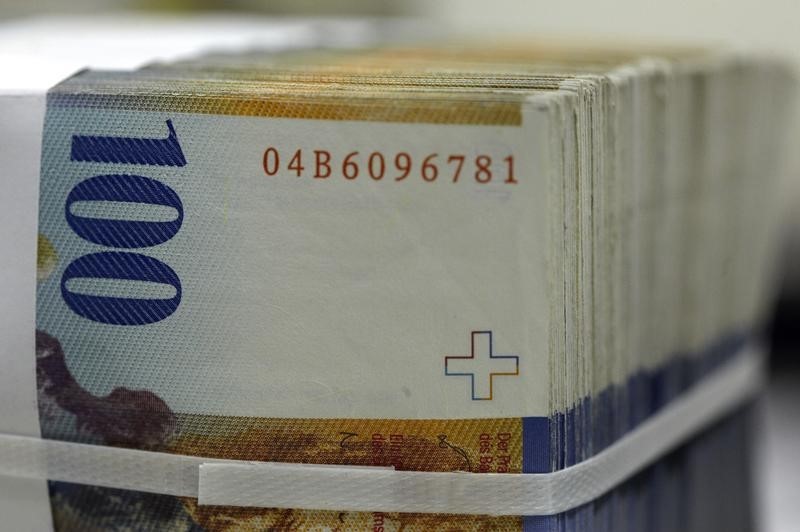Investing.com - The Swiss franc rose to fresh one-month highs against the dollar on Thursday after the Swiss National Bank left its deposit rate on hold at a record low and reiterated that it is still prepared to take further action to weaken the franc.
USD/CHF hit lows of 0.9174, the weakest since May 18, down from around 0.9219 ahead of the announcement.
The SNB maintained its rate on sight deposits at minus 0.75%, in line with economists’ forecasts. The central bank also left the target range for the three-month Libor unchanged at between minus 1.25% and minus 0.25%.
The SNB said negative rates should help to weaken the currency over time.
Negative rates effectively mean banks are paying the central bank to hold their money.
The central bank said uncertainty about the global economy “remains high,” particularly the threat of a Greek default.
“Various risks – first and foremost the difficult financial situation in Greece and geopolitical tensions, could jeopardize the recovery,” the bank’s statement said.
The bank reiterated that it is prepared to remain active in currency markets to reduce the impact of the “overvalued” franc on the economy.
"The SNB takes account of the exchange rate situation, and its impact on inflation and economic developments, in formulating its monetary policy," the SNB said.
"It will therefore remain active in the foreign exchange market, as necessary, in order to influence monetary conditions."
The Swiss franc is seen as a safe haven investment because of Switzerland's current account surplus, which means it’s not reliant on foreign investment to fund its budget.
Switzerland’s central bank cut its interest rate target into negative territory in January. The move was announced at the same time the bank scrapped its cap of 1.20 francs per euro, which sent the franc sharply higher.
The SNB said it expects economic growth of just below 1% this year, unchanged from its March forecast.
It said consumer prices will fall 1% this year and 0.4% in 2016, before picking up in 2017. In March it forecast a 1.1% decline in inflation this year.
The greenback remained broadly weaker after the Federal Reserve tempered expectations for a rate hike, saying that markets should not focus on the timing of an initial interest rate increase.
The Fed lowered both its U.S. growth forecast and its interest-rate projections on Wednesday, prompting investors to push back expectations on the timing of an initial rate hike.
Fed Chair Janet Yellen said the central bank wanted to see “more decisive evidence” of sustained growth before raising rates, but acknowledged that the economy has “expanded moderately” after a weak first quarter.
EUR/CHF was last at 1.0456, down slightly from around 1.0469 earlier.
Sentiment on the euro remained fragile as a deadlock between Greece and its international lenders continued ahead of the approaching deadline for Greece’s repayments to the International Monetary Fund at the end of the month.
A default by Greece could lead to the country’s exit from the euro zone.
The Greek central bank warned Wednesday that the country could be plunged into an “uncontrollable crisis”, unless a deal is agreed soon.
European finance ministers were to hold talks in Brussels later Thursday, but expectations for a deal were not high.
